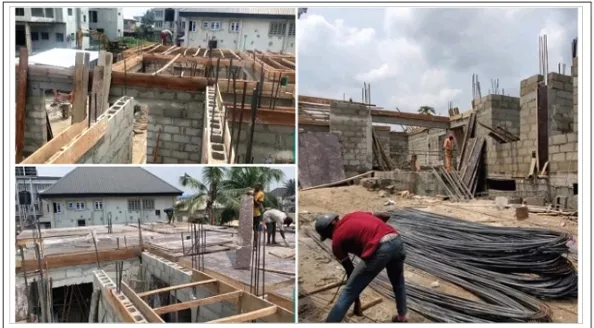With Nigeria’s current population at 215 million as estimated by the World Bank, and annual population growth of 2.4 percent, any lag in the construction of homes puts more Nigerians at risk of becoming homeless. This may manifest in the form of an increase in the cost of rent or simply, the lack of adequate housing.
The cost of cement in Nigeria has surged recently, driven by various factors, including the removal of fuel subsidies and the depreciation of the Naira against the US dollar, which is now flirting at a rate of N1,000 to 1 USD. The International Monetary Fund (IMF) has expressed concerns about the strong dollar’s negative impact on Nigeria’s economic output.
This surge in cement prices is not just a matter of economic concern; it has far-reaching implications for the housing and construction sectors, potentially exacerbating homelessness and widening the existing housing deficit.
The construction industry, a significant contributor to Nigeria’s Gross Domestic Product (GDP), faced a 7.4% decline in the first quarter of 2023. According to data from the Nigeria Bureau of Statistics (NBS), the sector generated N8.33 trillion in the quarter, compared to N9 trillion in the previous quarter (Q4 2022). The decline is attributed to the adverse effects of a cash shortage during the quarter, partly caused by the Naira redesign.
But even long after the naira redesigns brouhaha, the price of cement remains stubbornly high, with projections among some stakeholders that if nothing is done to intervene, the price of the major commodity may reach N9,000 soon.
This decline falls slightly below the projections of international organizations like the World Bank, IMF, and African Development Bank, which expected a slower GDP growth rate of around three percent due to challenges related to the Naira redesign and political transition. The construction sector’s real growth rate dropped by 1.56% compared to the previous year, but it still contributed 11.79% to nominal GDP in the first quarter of the year.
Despite the sector’s decline, cement prices have reached all-time highs in various regions of Nigeria. For instance, in Lagos, parts of Ogun, Rivers, and several states in the Southeast, the price of a 50-kilogram bag of cement, which initially ranged from N4,800 to N5,000, now sells for circa N6,000. This increase comes as a surprise, considering that the rainy season typically witnesses reduced construction activity and lower demand for cement.
Several factors have contributed to the rising prices of construction materials, including the unfavorable Naira-to-Dollar exchange rate, transportation costs, and increased energy and electricity expenses, which are essential for cement production. Additionally, some catalysts used in cement production are imported, further increasing costs.
Experts have pointed out that the high cost of materials in the construction industry is not solely due to weather conditions but also related to factors inhibiting the manufacturing sector, such as high electricity costs, transportation expenses, and poor infrastructure. Moreover, the government’s policies and importation practices have created near-monopolies in the cement industry, limiting competition and potentially driving up prices.
To address the soaring cost of building materials, experts suggest developing local alternatives and promoting policies that support competition in the manufacturing sector. They emphasize the need for more affordable building materials, especially cement, as it constitutes a significant portion of construction costs.
The rising prices of construction materials, including cement, could exacerbate housing challenges, increase the housing deficit, and make homeownership less accessible for many Nigerians.
This would weigh heavily on the already increasingly impoverished population, with decreasing disposable income due to inflation and a widening rate of unemployment.
The housing deficit in Nigeria is already substantial, and these price increases may widen the gap further. High costs of building materials can deter developers from undertaking new projects, exacerbating the housing shortage.
As housing costs rise, rents are likely to follow suit, making it harder for low-income individuals and families to secure housing. This situation can contribute to rising inflation and a squeeze on disposable income.
The construction industry relies heavily on a stable supply of building materials. Any disruptions in the supply chain due to rising costs can lead to delays in construction projects, affecting the overall economy.
NATIONAL ECONOMY spoke with an architect, and member of the Nigerian Institute of Architects (NIA), Samuel Ojake who urged the government to encourage the development of local alternatives for building materials to reduce dependence on imports and create more stable supply chains. He said there are good alternatives to the use of cement such as lumber and clay.
He also advocated for a level playing field for the promotion of competition in the cement manufacturing industry to prevent monopolistic control and ensure fair pricing.
An economist, Dr. Albert Koke, also speaking with NATIONAL ECONOMY, called for policy consistency. He said maintaining consistent government policies and programmes to provide stability in the manufacturing and construction sectors is necessary to woo local and foreign investment.
He also called on the government to address transportation and infrastructure challenges, including bad roads, to reduce the costs associated with transporting building materials, especially cement.
On his part, a lecturer at Nnamdi Azikiwe University, Dr. Felix Echekoba, said the surge in cement prices in Nigeria is a multifaceted challenge with far-reaching consequences. “It not only threatens the affordability of housing but also hampers economic growth. Addressing these issues will require a concerted effort from both the public and private sectors to ensure that Nigerians have access to affordable housing and that the construction industry can thrive despite these obstacles. Failure to do so may result in a growing homeless population and a widening housing deficit,’ he said.





